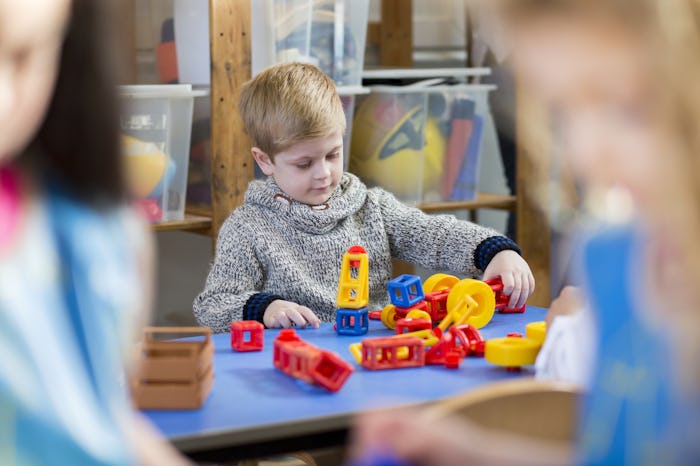I recently volunteered at my daughter's preschool and it was so fascinating to see the variety of personalities at that age. Some kids were quick to cluster together while other kids were holed up in their own little nooks, reading or caught up in their own imaginative games. It turns out kids are a lot like us: some are extroverts and some introverts. But if your toddler really seems to steer clear of social play, you might be wondering, "Can a toddler be anti-social?"
The answer to that depends on how you define anti-social. The word anti-social has become part of our everyday, adult jargon. Just the other day I caught myself saying, "I was totally anti-social and binge-watched the entire second season of The Crown." Obviously, the meaning there was I just didn't want to deal with humanity that particular Friday night.
But, to a clinician, anti-social means something totally different. Symptoms of a child exhibiting anti-social behavior include irritability and aggressiveness, and disregard for others, according to Psychology Today. These types of conduct problems usually show up in early childhood and adolescence, and currently affect between 4 to 6 million children, reported Healthline.
"It’s typical for kids to want to play alone, it’s typical for kids to be very different than their parents, it’s not typical for a child to repeatedly hurt the dog when they were told not to," explains Maureen Healy, child development expert and author of the book, Growing Happy Kids, and the upcoming book, Raising an Emotionally Healthy Child, available in October.
If a child is displaying unusual levels of aggression or hostility, they should be checked out by a medical professional, advises Healy. But if your son or daughter just doesn't want to hang out with other kids sometimes, or is a lot less social than you or your partner, it's probably not a problem. In fact, a lot of the time the problem is really with us as parents projecting onto our kids.
"Little kids are like all adults, sometimes you want to hang out and sometimes you don't. When you’re little, you’re running purely on emotions. You’re not being logical and saying, 'It would be good if I hung out with these people,' like adults do. A child's logic doesn't come [on] until 4, so until then they're operating purely on instinct and emotion," explains Healy.
But if you are uber outgoing, or you partner is a real social butterfly, it's easy to wonder what's wrong with your child for not being the same way. "When parents have a very shy or introverted child, and they are not that way, that’s when a lot of these issues come up. As adults we project a lot onto our kids, but everyone has a different level of need," explains Healy.
For adults, that noisy restaurant with the tv's blaring or that super crowded birthday party, it all becomes part of our normal threshold, but for a child those things can all feel entirely new and overwhelming, according to Healy.
What's more, your definition of 'healthy relationships' may be wildly different than that of your child. "It might look different than what mom and dad wants. Mom might need 15 friends, whereas the daughter might need one," notes Healy.
It can certainly be be difficult if you thrived in a team sports environment but your toddler kicks and screams at the mere mention of soccer practice. Or if you love hosting play dates but your child wants nothing to do with them. So how do your support a particularly shy or sensitive child?
It's all about having awareness of your child. "We all have expectations: my child needs to be on a sports team, or xyz, but it's all about finding the right match for your child. You want to build confidence, and help them develop on a social, physical, emotional, and creative level," recommends Healy.
And perhaps the most important thing to remember is that children are sometimes more like adults than we realize. Just like when I opted to stay in and watch The Crown because the idea having to go to a party seemed too exhausting for words, our children can be feeling that exact same way, but lack the language skills to adequately express it. Knowing that can help you better empathize with your toddler for being "anti-social" from time to time.
Check out Romper's new video series, Bearing The Motherload, where disagreeing parents from different sides of an issue sit down with a mediator and talk about how to support (and not judge) each other’s parenting perspectives. New episodes air Mondays on Facebook.
